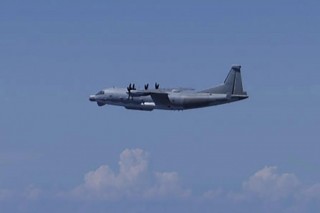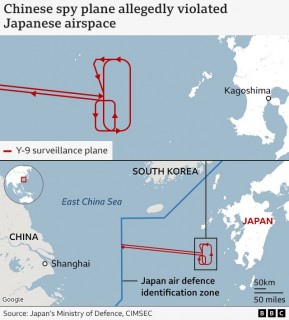Loading
Search
▼ Japan Says Chinese Spy Plane Violated Its Airspace
- Category:Other
Japan has accused a Chinese spy plane of breaching its airspace, in what would be the first known instance of such a direct violation.
Japan scrambled fighter jets after a Y-9 surveillance plane "violated the territorial airspace" of Danjo Islands for about two minutes at 11:29 local time Monday (02:29 GMT).
Japan's Chief Cabinet Secretary called the breach "utterly unacceptable" and summoned a Chinese embassy official in Tokyo in protest.
The incident comes as tensions rise in the region, where China competes for influence against the US and its allies, including Japan.
Japanese authorities issued "notifications and warnings" to the Chinese aircraft during Monday's incursion, but no weapons such as flare guns were used, according to Japanese broadcaster NHK.
Nonetheless, the incident has stoked concern.
The Japanese government said it had contacted Beijing through diplomatic channels to lodge a strong protest over the incursion and demand the prevention of such breaches in the future.
Chinese foreign ministry spokesperson Lin Jian said they had "no intention of invading the airspace of any country" and that relevant departments were still trying to understand the situation, reported Reuters.
Tokyo also recently flagged the presence of Chinese ships in the Senkaku Islands in the East China Sea, which are claimed by China and which Beijing calls the Diaoyus.
The islands, which are uninhabited but potentially possess oil and gas reserves, are one of several sources of tension between Beijing and its neighbours - most of whom are American allies.
Another is Japan's Okinawa island, which is home to the largest US military installation in the Asia-Pacific region. There are also American troops stationed in Taiwan, the Philippines and South Korea.
"This latest incursion may seem alarming as China tends not to venture directly into Japanese airspace," Professor Ian Chong, a Chinese foreign policy expert at the National University of Singapore, told the BBC.
"Although it is consistent with China's behaviour as regards Taiwan and the Philippines in recent years."
In a single day last month, Taiwan's defence ministry reported 66 incursions by Chinese military aircraft across the so-called 'median line' - an informal border between the two sides in the Taiwan Strait.
Beijing does not recognise the median line and, according to Taiwan, its planes have breached it hundreds of times in the past two years.
The Philippines, meanwhile, recently called China the "greatest disrupter of peace" in South East Asia.
Those comments followed a clash in a disputed part of the South China Sea on Sunday, over what Manila said was a resupply mission for fishermen.
"We have to expect these kinds of behaviour from China because this is a struggle," said Philippines Defense Secretary Gilberto Teodoro.
"We have to be ready to anticipate and to get used to these kinds of acts of China which are patently illegal, as we have repeatedly said," he told reporters on Monday.
The US national security advisor, Jake Sullivan, is in Beijing this week for talks with China's foreign minister, Wang Yi.
The two sides will discuss their differences over several flashpoints in the region and across the world.
"Washington probably will be looking at ways to avoid uncontrolled escalation, although this proposition can be difficult to put into practice," said Professor Chong.
Another is Japan's Okinawa island, which is home to the largest US military installation in the Asia-Pacific region. There are also American troops stationed in Taiwan, the Philippines and South Korea.
"This latest incursion may seem alarming as China tends not to venture directly into Japanese airspace," Professor Ian Chong, a Chinese foreign policy expert at the National University of Singapore, told the BBC.
"Although it is consistent with China's behaviour as regards Taiwan and the Philippines in recent years."
In a single day last month, Taiwan's defence ministry reported 66 incursions by Chinese military aircraft across the so-called 'median line' - an informal border between the two sides in the Taiwan Strait.
Beijing does not recognise the median line and, according to Taiwan, its planes have breached it hundreds of times in the past two years.
The Philippines, meanwhile, recently called China the "greatest disrupter of peace" in South East Asia.
Those comments followed a clash in a disputed part of the South China Sea on Sunday, over what Manila said was a resupply mission for fishermen.
"We have to expect these kinds of behaviour from China because this is a struggle," said Philippines Defense Secretary Gilberto Teodoro.
"We have to be ready to anticipate and to get used to these kinds of acts of China which are patently illegal, as we have repeatedly said," he told reporters on Monday.
The US national security advisor, Jake Sullivan, is in Beijing this week for talks with China's foreign minister, Wang Yi.
The two sides will discuss their differences over several flashpoints in the region and across the world.
"Washington probably will be looking at ways to avoid uncontrolled escalation, although this proposition can be difficult to put into practice," said Professor Chong.
- August 27, 2024
- Comment (0)
- Trackback(0)



